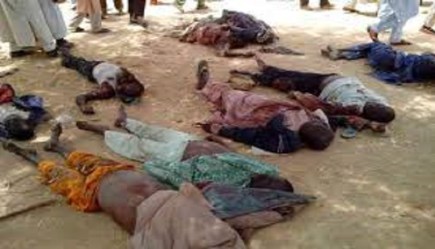A security analysis project, the Nigeria Security Tracker, has revealed that 25, 794 Nigerians may have lost their lives in violent crises in the first four years of President Muhammadu Buhari.
The report, which is a project of the Council on Foreign Relations, a nonprofit think tank specialising in United States foreign policy and international affairs, highlights those killed by different insurgent groups and Boko Haram in the North, including herdsmen and bandits.
According to the report, Borno suffered the highest casualties, recording 9,303 deaths during the period under review, followed by Zamfara (1,963) and Adamawa (1,529).
Others captured in the map are Kaduna (1,488), Plateau (771), Taraba (649), Benue (1,642), Niger (252) Rivers (730), Cross River (467), Ogun (301), among others.
It also shows that the highest casualties were recorded in July 2015 (1,299) and January 2019 (1,077).
Boko Haram alone was responsible for 5,598 deaths, while sectarian violence, including the herdsmen-farmers crisis, led to 4,917 deaths.
On the other hand, state actors, including the military, were said to have killed 4,068 people.
READ ALSO: “Shut up and act like an elder” – Jimi Agbaje tells Bode George over claims he has left PDP
The report extended to the tenure of former President Goodluck Jonathan (June 2011 to May 2015), when a total of 34,884 people were reportedly killed across the country.
The highest record of casualties was in March 2014, when 3,456 Nigerians were killed, while Boko Haram and the military were together responsible for 12,765 deaths.
Explaining the data gathering process, the Council on Foreign Relations, said, “The Nigeria Security Tracker tracks violence that is both causal and symptomatic of Nigeria’s political instability and citizen alienation. The data are based on weekly surveys of Nigerian and international media.
“The data start with May 29, 2011, the date of Goodluck Jonathan’s inauguration as president. It was an event that highlighted the increasing bifurcation of the country on regional and religious lines. The NST is updated weekly.
“Relying on press reports of violence presents methodological limitations. There is a dearth of accurate reporting across certain regions, death tolls are imprecise, and accounts of incidents vary. There is the potential for political manipulation of media. Given these limitations, the NST makes every effort to collect information from multiple sources. Nevertheless, NST statistics should be viewed as indicative rather than definitive.”

